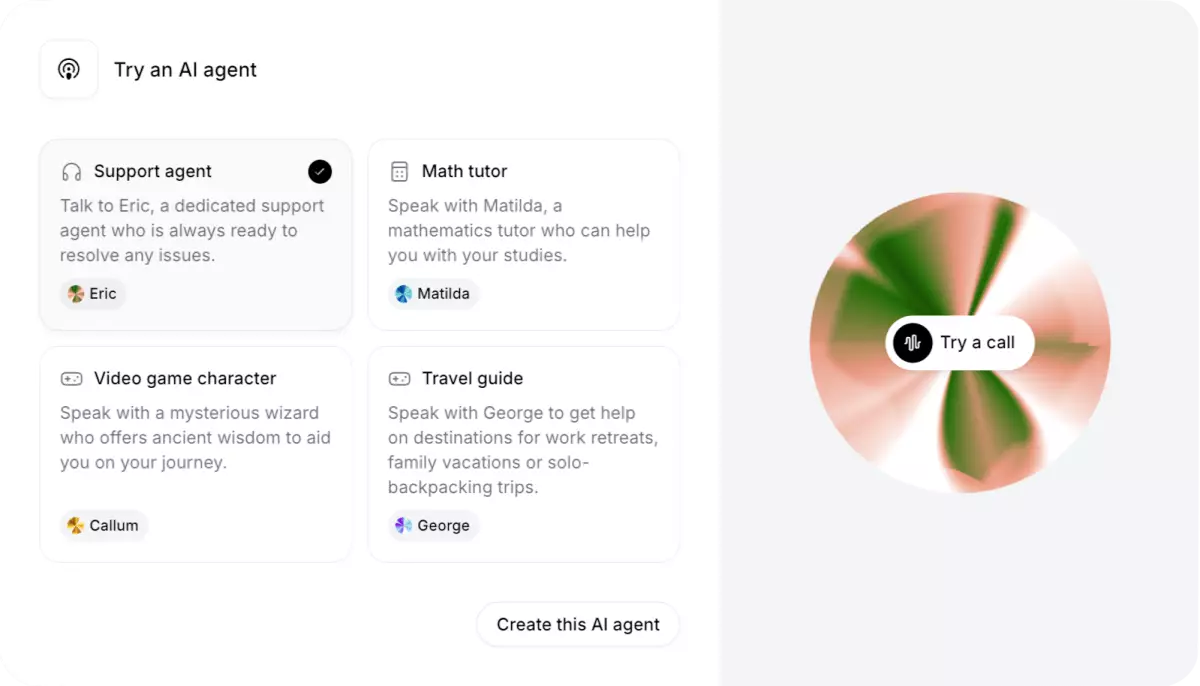In an era where artificial intelligence (AI) is reshaping the way we interact with technology, ElevenLabs emerges as a pioneering startup dedicated to refining voice synthesis techniques. Known primarily for its AI voice cloning and text-to-speech API, ElevenLabs has announced a significant leap forward in AI capability: the introduction of conversational AI bots. This innovation enables users to develop fully functional conversational agents through its developer platform, offering unique customization options that cater to various user needs. As the AI landscape accelerates, ElevenLabs aims to enhance human-computer interaction in unprecedented ways.
Building Conversational Agents with Ease
The platform offers a user-friendly interface for building conversational agents, empowering developers to create tailored experiences. Users can access a range of templates or start projects from scratch, thereby providing flexibility in design. Key features include the ability to determine the agent’s tone of voice, response length, and even its language. Such extensive customization sets ElevenLabs apart, allowing businesses to create bots aligned more closely with their brand’s identity and customer service ethos.
Sam Sklar, ElevenLabs’ head of growth, highlighted that a considerable number of their existing clientele already engages in creating conversational AI agents. However, the complexity of integrating robust knowledge bases and managing customer interactions has proven challenging. Recognizing this gap, ElevenLabs has engineered a streamlined pipeline for developing conversational bots, reducing barriers for users aiming to adopt this technology.
Technical Specifications and Capabilities
In developing these conversational agents, users can select from an array of large language models, including options such as Gemini, GPT, and Claude. Furthermore, parameters like response creativity (controlled by adjusting the response temperature) and token limits can be set according to specific needs. These technical choices are crucial, ensuring that the bots not only respond accurately but also align with the user’s desired output style.
Moreover, developers can customize additional elements like latency, stability, and authentication criteria while also defining how lengthy conversations with the AI can last. Integration of a personalized knowledge base—whether through files, URLs, or specific text blocks—becomes pivotal in making these conversational agents both functional and informative.
The competitive landscape surrounding ElevenLabs is robust, with emerging players in the voice AI domain also making strides. Companies such as Vapi and Retell are emulating ElevenLabs’ offerings, vying for a share of the emerging conversational AI market. However, the introduction of ElevenLabs’ customizable agents aims to provide a distinct competitive advantage, one that could ultimately attract a loyal customer base.
Notably, the company is not just focused on conversational capabilities. There are plans to develop its own speech-to-text functionalities, broadening its service offerings. While the speech-to-text API is not currently available as an independent product, ElevenLabs’ aspirations suggest a future entry into a space currently dominated by established players like Google, Microsoft, and Amazon. Their proactive stance towards innovation could position them favorably against specialized offerings from companies like OpenAI’s Whisper and AssemblyAI.
As ElevenLabs charts its course in the ever-evolving arena of conversational AI, its emphasis on customization and flexibility raises expectations for future developments. By providing businesses with the tools to create specific conversational experiences, ElevenLabs is set to redefine the standard for user engagement.
With ambitions for new funding and a valuation projected over $3 billion, the company is eyeing a future replete with growth opportunities. Their approach to seamless integration of voice AI technology may position them as a significant contender against established players like OpenAI, particularly due to their differentiated offerings. The success of these conversational agents will hinge not only on customer adoption but also on ElevenLabs’ ability to continually innovate and enhance its services.
The launch of ElevenLabs’ capability for building conversational AI bots marks a pivotal development in the realm of voice technology. As the startup seeks to carve out a niche in a competitive landscape, it remains to be seen how they will evolve and respond to the needs of the market while navigating the complexities of AI-driven conversations. The future appears promising, both for ElevenLabs and for the broader field of conversational AI.

